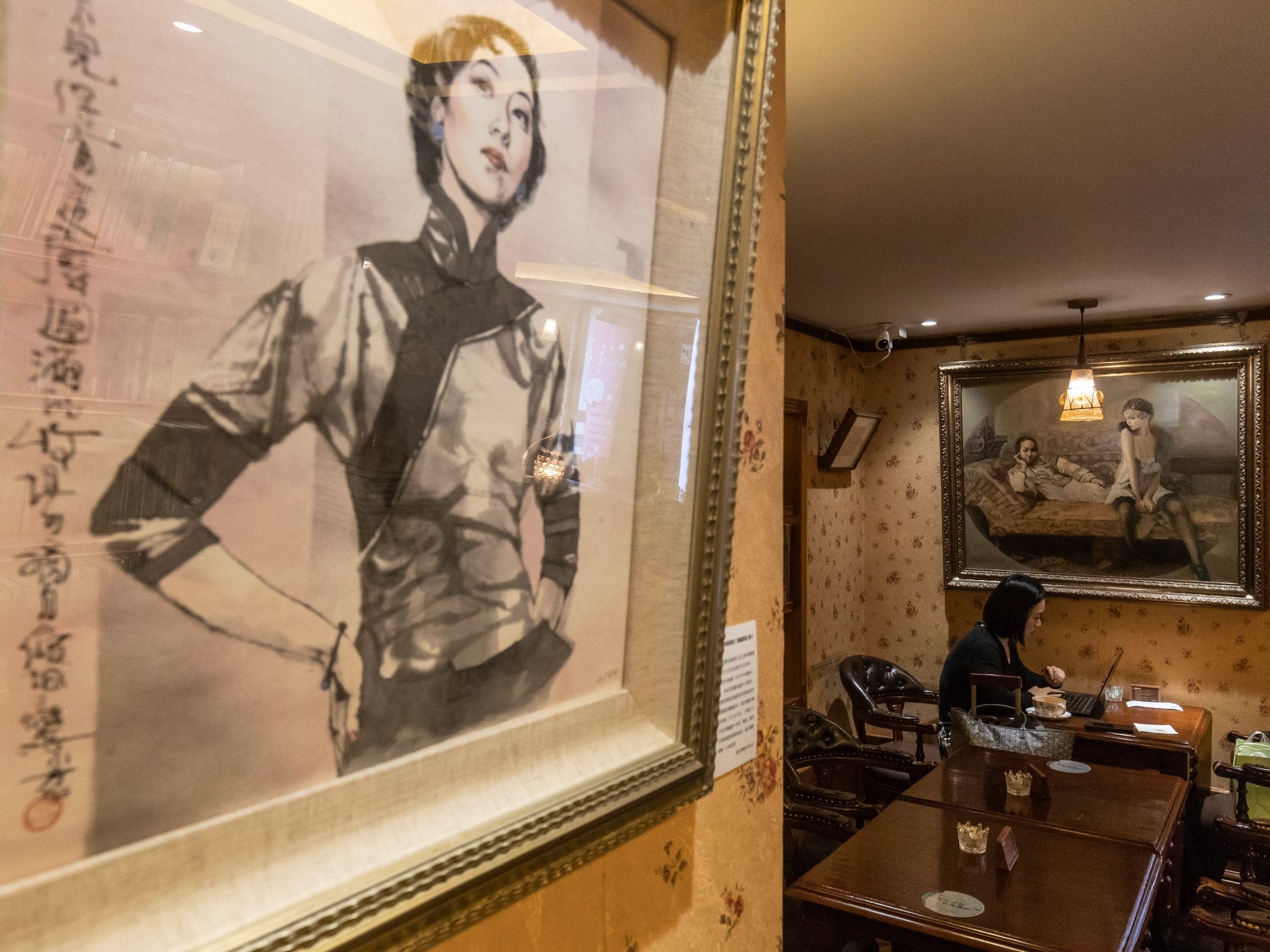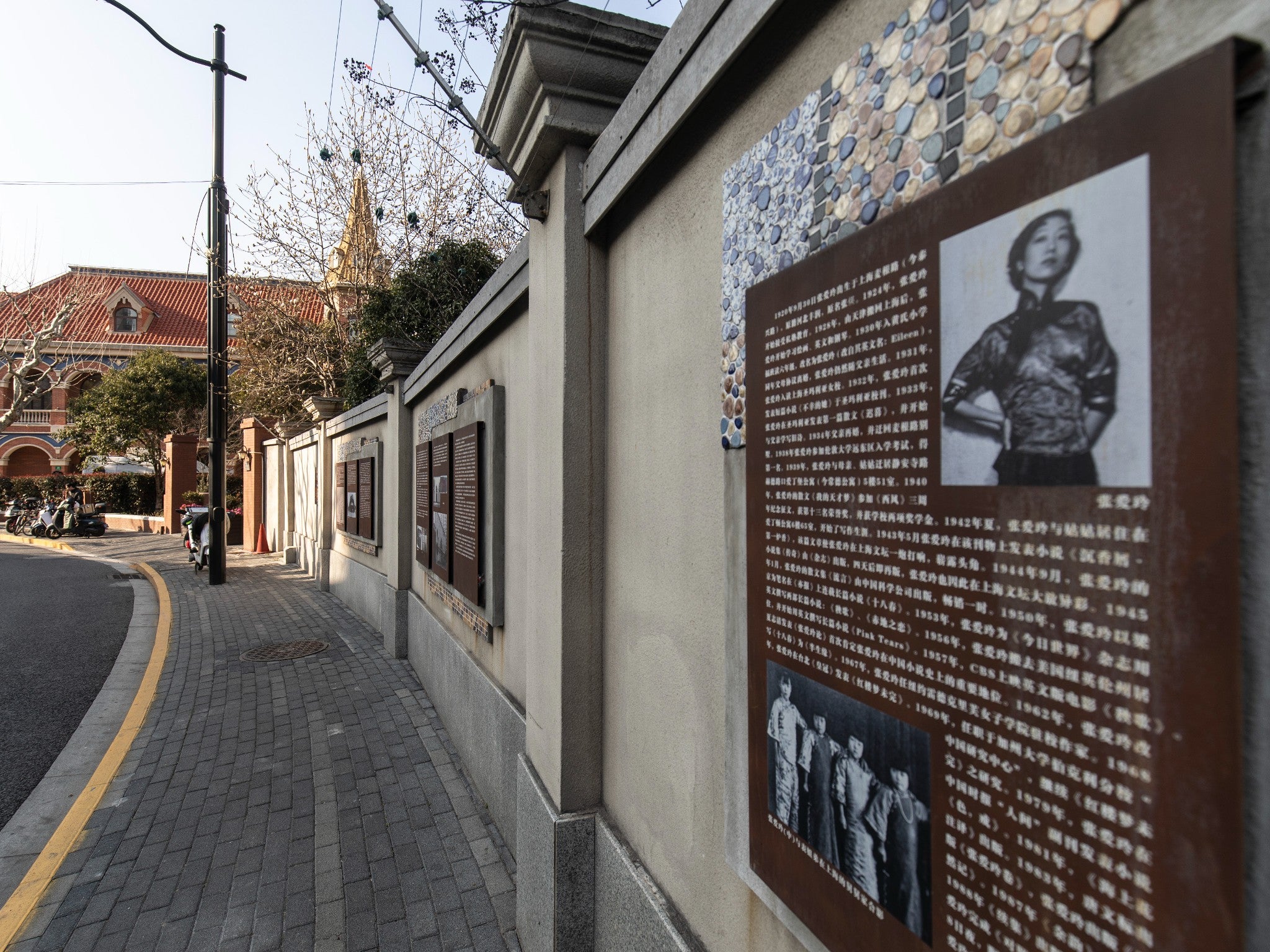Love, ambition and a lack of politics: Women in China flock to read Eileen Chang
Almost 30 years after her death in Los Angeles, Chang’s work has become a source of solace for a new generation, write Christian Shepherd, Lyric Li and Lisa Movius

On the ground floor of an Art Deco apartment building in Shanghai, where the Chinese writer Eileen Chang lived in the 1940s, fans stop at the Chang-themed cafe to sip coffee and read ‘‘Lust, Caution’’, one of her most renowned works.
Others might pick up a different volume - after all, she wrote more than 40 works of fiction, as well as screenplays and translations of Ernest Hemingway – or a Chang tote bag.
On any given day in Shanghai, it’s not unusual to find fans visiting her birthplace or going on guided Chang literary tours.
For 80 years, her books have pushed boundaries and opened minds in China – and almost 30 years after her death in Los Angeles, Chang’s work has become a source of solace for yet another generation of Chinese women.
They are particularly drawn to Chang’s focus on the personal – love, sex, ambition – and lack of interest in the political. She is sometimes called the Virginia Woolf of China, although Sally Rooney might be a more apt contemporary analogy.
‘‘She tapped into new ideas of the time, getting married then divorced, and being self-supporting,’’ says Nancy Guo, who was standing on the rooftop of the building where Chang was born in 1920 to an aristocratic family whose fortunes were in decline.
‘‘She brought this female perspective, part of the women’s awakening of that time,’’ says Guo.
In essays and posts on Chinese social media, fans regularly celebrate Chang’s defiance of patriarchal norms, her rejection of nationalism and her delight in everyday matters. Her decision to be defiantly unpolitical resonates with current-day readers, says Eileen Cheng-yin Chow, a scholar of Chinese literature and culture at North Carolina’s Duke University.
‘‘Every writer is political, but it’s a particular kind of political stance to be writing during wartime and to be deliberately unpolitical,’’ Chow says. Chang grew up in a period of great intellectual and political ferment in China: Japan occupied Shanghai when she was 17.
Her literary talents were obvious and so she pursued them – and escaped a troubled home life – by going to university in Hong Kong. She returned to Shanghai in the early 1940s and established herself as a writer just as the Second World War ended and the Chinese civil war resumed.

While many of her celebrated contemporaries obsessed over the affairs of the nation and the humiliation and hardship of China’s war with Japan, Chang told stories of lust, heartbreak and betrayal.
‘‘Generally speaking, I cannot write works that are ‘monuments of the times,’ and I don’t plan to try,’’ Chang said in an essay published in 1944.
‘‘I just write about little things that happen between men and women. There is no war in my work, there is no revolution,’’ she wrote. ‘‘I think it is when people are in love, more than in war or revolution that they are simpler and freer of restraint.’’
Back in Shanghai, Chang became famous, got married, got divorced, fell out of favour with the newly installed Communist Party leadership, fled back to Hong Kong and moved to the United States – all by the age of 35.
The dizzying pace of her early years didn’t last. Her English-language novels never broke into the American market, and Chang retreated from the public eye, living out her final years in Los Angeles as a near recluse. She died in 1995. But her stature in modern Chinese literature has only risen since. She is celebrated for her vivid imagery, keen emotional sensitivity and ability to blend Chinese and Western styles of writing.
Although unobtainable in mainland China until the 1980s, most of Chang’s works are now freely available, and a film or television show based on her work is released every few years.
Fascination with Chang in China first took off in the 1990s, as market reforms created a wave of optimism and openness. Many at the time felt nostalgic for the (often imagined) cosmopolitanism of 1930s Shanghai that they saw in her work.
Today, Chow explains, it is more Chang’s cynicism in response to the vicissitudes of politics that makes her a pointed symbol for young intellectuals.

‘‘That sense of dislocation – the Chinese phrase is ‘shengbufengshi,’ to be born out of time or to be slightly out of joint – is a much more potent affiliation now,’’ Chow says. Indeed, many of her more recent readers are drawn to her defiant lifestyle and sardonic worldview as much as they are to the crispness of her prose.
For young liberals uneasy about creeping ideological uniformity in Xi Jinping’s China, where everything from the school curriculum to blockbuster movies must support the Communist Party’s vision, Chang has come to represent an iconic example of resilience.
She insisted, in life and in writing, on putting personal and artistic freedoms first at a time when sacrificing for the good of the nation was in vogue.
In Love in a Fallen City, Sealed Off and Red Rose, White Rose, she told of whirlwind romances, scandalous affairs and dysfunctional marriages. Her characters were often selfish and immoral, but that is part of her allure.
‘‘Her writing is deeply feminist in the sense that she is one of the earliest female writers in China to write about sex, love and relationships in a way that isn’t a cliche,’’ says Na Zhong, a New York-based Chinese writer who translated Sally Rooney’s novels into Chinese and is working on a novel inspired by Chang’s life.
Zhong gives the example of Lust, Caution, one of Chang’s later novellas, in which the protagonist betrays her country by choosing her relationship with a Japanese sympathiser. She explains that the return of male-dominated values in China today is again giving women a sense of exclusion and dislocation. ‘‘In a highly patriarchal culture a woman is without a home, without a country, and Eileen Chang definitely grasped that in her stories,’’ she says.
Bloggers took the cue and shared a story of how Chang attended a meeting of Communist writers shortly before she left Shanghai for Hong Kong. Dressed in a glamorous silk qipao – a traditional Chinese dress – she cut a striking figure compared with the other Mao-suited attendees. This, commentators wrote, must have been when Chang realised she needed to get out.
Viewed through the harsh realities of today’s China, some fans are interpreting Chang’s decisions to leave as a form of bravery. Many tend to think her of final decades in the United States as a time of sadness and failure, but Zhong considers her acceptance of fate a kind of resilience.
‘‘She chose to live a ruthless life, and she embraced the consequences of her exile,’’ she says.
The drama of Chang’s personal life – which has given her an aura of mystique, glamour and infamy – adds to her lasting appeal.
‘‘Of course her work influenced me a lot,’’ Zhong says, ‘‘but it’s way of life, her worldview and her rejection of grand narratives that really inspires me.’’
Chang’s work has apparently inspired other contemporary Chinese women. Cao Zhixin, a twentysomething editor at a Beijing publishing house, considers Chang one of her literary idols and went on a Chang-themed walking tour in Shanghai in 2021.
Those close to Cao say her admiration for the author is not unrelated to her decision to take to the streets of Beijing last November to protest against the Chinese government’s ‘‘zero Covid’’ policies - which led to her being detained for four months.
‘‘She liked how the most important thing for Eileen Chang wasn’t rational thought but being moved by what you perceived,’’ says a friend who spoke on the condition of anonymity for fear of retaliation from Chinese authorities.
Cao was released last month but could not be reached for comment.
Megan Walsh, author of The Subplot: What China is Reading and Why It Matters, attributes much of Chang’s latest burst in popularity to the clarity of her mind.
‘‘Readers don’t think that she falls for anything other than what she sees and feels,’’ Walsh says. Young people in China today are ‘‘being told they are living through this great moment in Chinese history, but they aren’t really feeling it. Chang is offering something much more probing.’’
© The Washington Post






Join our commenting forum
Join thought-provoking conversations, follow other Independent readers and see their replies
Comments